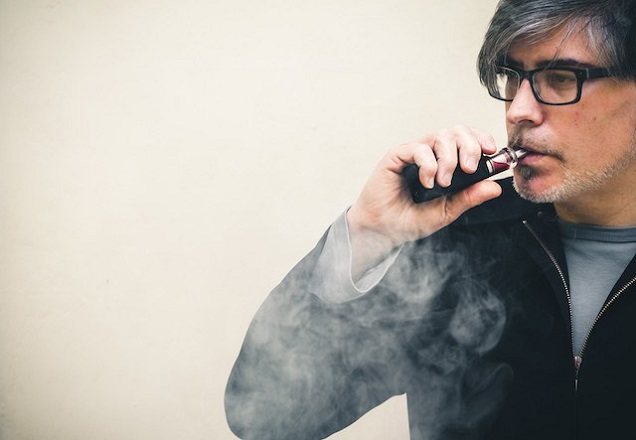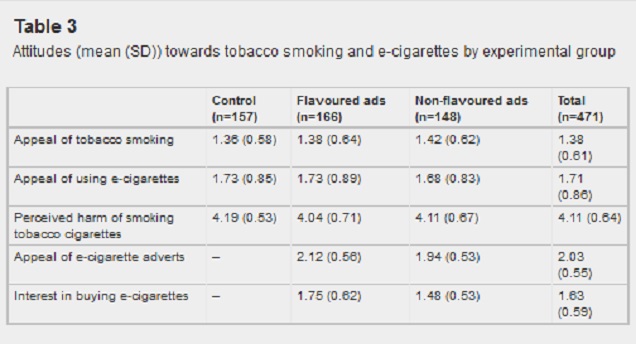
It’s time for the Week in Vaping. This week, ads for flavored e-cigs and flavored e-cigs themselves are luring teens into vaping (they aren’t), vaping impedes quitting and makes non-smokers start smoking (it doesn’t), indoor vaping bans are necessary for public health (they aren’t) and Public Health England were just hypnotized by the tobacco industry into saying e-cigarettes are much safer than cigarettes (of course!). So, let’s dive in!
E-Cigarette Research
E-Cig Ads and the Children
A new study has looked at the impact of (print) e-cigarette ads on the appeal of smoking and vaping to children. The study showed a group of 11 to 16 year olds ads for e-cigarettes, either flavored or “non-flavored,” and also left a control group unexposed to ads. The results showed that ads made no difference to the appeal of smoking or vaping, susceptibility to smoking or the perceived harm of smoking.

But those who saw the ads for flavored e-cigs had an interest in trying or buying e-cigs of 1.75 (on a scale from 1 – not at all interested – to 4 – very much interested), compared to 1.48 for those who saw ads for non-flavored e-cigs. Needless to say, this isn’t particularly concerning evidence for anything. They are basically not interested. This is all well-deconstructed in a post from Paul Barnes over at Facts Do Matter, with some additional commentary from Dave Dorn and a humorous look at the potential follow-up study from Lorien Jollye.
Gender and Vaping Habits
A new study has looked into the potential for gender differences in the use of and expectancies about vaping. For example, men were more likely to vape to quit smoking due to health concerns and to report enjoying it, whereas women vaped because of recommendations from loved ones and reported things like stress reduction. The (small) differences are much like those observed with smoking, as you’d expect.
E-Cigarette Flavors and Public Health
Another new study led to declarations that restricting e-cigarette flavors may benefit public health, by reducing the appeal to young smokers. The news was spun as saying that restricting flavors will prevent teens from taking up vaping, but not impact with older adult quitters, but that’s not what it found. It was a study conducted on adult smokers, and the result relating to flavors showed that young adult smokers were slightly more likely to buy e-cigs with multiple flavors, compared to older adults. So the reported conclusion is literally saying “stopping (younger) adult smokers from switching to vaping is good for public health.”
A statement like this earned lead author Michael Pesko the title of “Crazy of the Week” from Dick Puddlecote.
E-Cigarettes Prevent Quitting
A study from Switzerland (actually published last week) has led to claims that e-cigarettes impede quitting and lead non-smokers to start smoking. It presents itself as longitudinal – following changes in smoking and vaping status over a year – but it actually only asked about vaping at the end of the study period. This makes it effectively cross-sectional, unable to determine whether the participants’ smoking status changed before or after they vaped. In other words, neither of the claimed conclusions is supported by the data. Michael Siegel calls it a “complete sham.”
Junk Science of Glantzian Proportions
Carl V. Phillips wrote another Sunday Science Lesson in response to Stanton Glantz’s disastrous meta-analysis last week, which is worth reading if you’re interested in learning more about the study design and getting more insight into exactly why Glantz is as catastrophically wrong as ever.
Regulations, Legislation and Vaping Bans

Indoor Vaping Bans
Ashland, Kentucky has decided to include vaping products in it’s indoor smoking ban, a move which has earned the ire of the local vaping community. Vape stores would be exempted from the ban, though. The “logic” behind the move is perfectly summed up in this quote from Mayor Chuck Charles: “When you’ve got a chemical that’s used in anti-freeze, it doesn’t take much to realize it’s harmful.”
The proposed ban on indoor vaping in Kittitas County, Washington is continuing to move forwards, with the Board of Health debating whether vape stores should be included in the ban this Thursday. Thankfully, there was a lot of opposition to the suggestion, and minors would be banned from entering vape stores anyway. The legislation is due for a public hearing in March, before becoming law.
A Virginia bill would ban vaping in several public places, including restaurants, elevators, schools, school buses and cashier lines.
Other Legislation
Bufallo Grove, Illinois is considering requiring vape stores to be 100 to 150 feet away from schools and parks, in a bid to stop kids vaping. Although none of the existing vape stores would be affected, so it would literally accomplish nothing.
Vape stores and tobacco stores have been banned from opening in American Canyon, California. There currently aren’t any operating in the city, and with the new ordinance, it will stay that way.
Raising the Minimum Age for Tobacco
New Jersey Governor Chris Christie has decided not to raise the age of buying tobacco to 21, to the disdain of many anti-tobacco groups hoping to make it harder for young adults to start smoking. It would be a decent idea, but the fact that under-age smoking is still a big issue suggests it wouldn’t have worked that well. CASAA has a brief blog post on the decision, in particular praising the fact that vaping products will continue to be available to 18 to 20 year olds.
Vaping Prohibition and Regulation Around the World
An article published in the Medical Journal of Australia calls for liberalization of the existing rules on e-cigs in Australia – which vary by state, but effectively make it difficult to find nicotine-containing e-liquid – based on the situation in the UK. It makes perfect sense and is wholly based on the scientific evidence so far, so it will probably be ignored.
Germany is set to ban menthol e-liquid flavors in their adoption of the EU Tobacco Products Directive, along with several other flavors, as well as banning the use of vitamins, additives and stimulants such as caffeine or taurine in e-liquid. The decision to ban menthol is a particularly baffling one, but obviously stems from the concern surrounding menthol cigarettes. At present, the list of banned flavors is only provisional.
The Fatwa Council of Sabah in Malaysia is the latest to declare vaping – alongside hookah – as “haram” (forbidden) due to negative health effects. They also said “all activities involving the business” are illegal according to Shariah law. The State Islamic Department has to make the final decision before it becomes law, though.
News, Blog Posts and Other Stuff
Dick Puddlecote has published a pair of blog posts looking into the correspondence between anti-vaping fanatic Martin McKee and the UK’s Chief Medical Officer. Among other things, the emails reveal that McKee was indeed an author of the anonymous Lancet editorial which attacked Public Health England’s report that declared e-cigarettes 95% safer than smoking. There’s more than this from McKee, but it’s so hilariously dumb that it’ll be covered a little later in a more appropriate section.
Cancer Research UK has published an excellent blog post about the flurry of headlines recently about the supposed risks and ineffectiveness of e-cigarettes. The post is a good resource to share with confused or concerned smokers or pretty much anyone else duped by the most recent stream of sloppy science making it past apathetic peer reviewers and being picked up by credulous journalists hungry for a scare-story.
Greg Conley has had an article published in the Chicago Sun-Times calling for a halt to the over-hyped nonsense written about the potential dangers of e-cigarettes.
Olympia Vapor Works has a great post showcasing some of the best box mods to hit the market this year so far, including the Vaporflask Stout, the Joyetech Cuboid, the Wotofo Chieftain 220 and others.
E-Cigarette Direct’s Ashtray Blog has a handy post explaining how the EU e-cigarette regulations will affect retailers – a must-read for anybody in the industry in Europe, and especially the UK.
Bullshit of the Week – “Public Health England are Big Tobacco Puppets”

Martin McKee’s emails to the UK Chief Medical Officer contain some true pearls of bullshit, and one of them takes the cake for this week. It seems his whole issue with the 95 % safer claim is steeped in a hugely illogical conspiracy theory. The idea is that PHE weren’t, you know, looking at the available evidence and telling the truth, they were simply repeating tobacco industry propaganda like mindless drones. This is the key quote:
Only you [Davies], me, Tony Delamothe, Simon Capewell and Simon Chapman know we have found that the 95% figure that Duncan [Selbie] made so prominent in his foreword and Kevin [Fenton] has been announcing to the world was originally created by [British American Tobacco].
Dick Puddlecote points out that this pattern of crying “tobacco industry” whenever you can’t respond to an opposing argument is enshrined in the system of tobacco control. It’s literally taught in second hand smoke policy training, as covered in an old (and very interesting) post from Michael Siegel. It has no basis in fact; it’s just blindly throwing mud and hoping some of it sticks.
The most concise explanation of why it’s so patently false in this case comes from David Sweanor in the comments to Puddlecote’s blog post:
Seriously, can they really think that a company that makes billions a year selling cigarettes and is largely run by a legal department focused on seeing off litigation risks would orchestrate a plot to manipulate health professionals into showing that those cigarettes are massively more hazardous than viable alternative products? Any such plot would have to come from another source. So if they don’t want to ascribe it to an honest evaluation of the science I suggest they look elsewhere. Something more logical than their initial conspiracy theory.
Nothing more needs to be said. McKee’s argument is: “the tobacco industry is manipulating public health organizations into declaring a competing product vastly safer.”
Check Back Next Week for More!
As always, we’ve looked for all of the most important vaping news from this week, but we may have missed something: let us know in the comments if we did! If not, check back next week for another edition!

